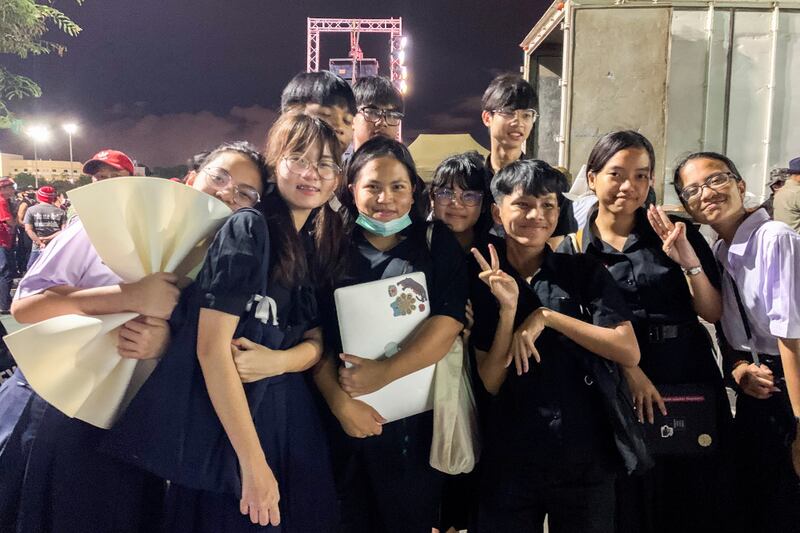Human rights advocates and lawyers are demanding the Thai justice system be reformed after a jailed 28-year-old activist who was on a hunger strike while in custody died of apparent heart failure Tuesday.
Netiporn "Bung" Sanesangkhom, a member of the Thaluwang activism group, who died at the Medical Correctional Hospital, had been denied bail after being charged under Thailand's strict royal defamation law, lèse-majesté (also known as Article 112).
She is the first activist to die following a hunger strike while incarcerated, according to Thai Lawyers for Human Rights (TLHR).
The Thaluwang group’s members are young political activists whose agenda is to challenge the power of the monarchy and campaign for reforms to that institution.
“Bung was prosecuted under Article 112 for exercising freedom of political movement, which should be allowed in a democratic country. Instead, she was prosecuted and denied bail, even though in Bung’s conscience, her actions did not constitute any violation,” Pornpen Khongkachonkiet, director of the Cross-Cultural Foundation, a Thai NGO, told BenarNews.
“This injustice stems from societal biases that allow judges to detain him without any self-monitoring process, resulting in judicial insensitivity.”
Bung died at 11:22 a.m. on Tuesday at Thammasat University Hospital after being transferred from the Medical Correctional Hospital, where she was found unconscious and without vital signs at 6:23 a.m., corrections officials said.
“When the system fails to recognize its own flaws, there is no improvement. Bung used her own body to demand change in this problematic system. What the state should do is grant bail rights to activists and release them unconditionally because there is already an example of someone dying for pushing for change. Society should not allow a second, third or fourth person to die,” Pornpen said.
Justice Minister Tawee Sodsong promised that Bung’s death would be fully investigated.
“The principle is that an autopsy must be conducted by a forensic doctor, along with the investigating officer, public prosecutor, administration and relevant parties, to be completed within seven days. As the government and the minister, we are saddened and want the verification process to be straightforward to provide peace of mind to all parties,” Tawee said.

The activist was charged under Article 112 of Thailand’s criminal code for conducting a survey at a Bangkok shopping mall in February 2022 about whether royal motorcades were disruptive to the lives of people in the often traffic-choked Thai capital.
Bung was arrested on Jan. 26 after the Criminal Court revoked bail, citing a violation of conditions for protesting in front of the Ministry of Culture on Aug. 6, 2023. During that protest demonstrators called for a Thai senator, Naowarat Pongpaiboon, to be stripped of his honorary title of national artist for abstaining from a parliamentary vote that ended up blocking opposition leader Pita Limjaroenrat's path to power as prime minister.
Bung went on a hunger strike shortly after being taken into custody.
"Our lawyers visited her every day – she was swollen, had stomach pain and said she was sick. The doctor said these were symptoms of someone who had been fasting and was recovering. Bung's family pleaded with her to eat, but she couldn't because she had been fasting for three to four months and her body was weak," said Kritsadang Nutcharas, a lawyer with TLHR.
“In fact, she still stood firm that what she did and said was what she deemed appropriate to call for justice system reform and the amendment or abolition of Article 112. She still believed that,” Kritsadang told reporters, adding she repeatedly insisted that Bung be sent for treatment.
Bung maintained her hunger strike after the Southern Bangkok Criminal Court denied TLHR’s request for bail, Kritsadang said.
Nearly 2,000 prosecuted
The lawyers’ group reported that since the “Free Youth” protests began on July 18, 2020 – at the height of the COVID-19 pandemic in Thailand – at least 1,954 people had been prosecuted in 1,295 cases related to the demonstrations and the expression of political opinions.
Among these, at least 272 people are facing charges under Article 112 in 303 cases, including at least 45 who remain detained. Among them is Tantawan Tuatulanon, who is on her own hunger strike.
Thaluwang became active in 2022, aligning with the ongoing political activist movements demanding that then-Prime Minister Prayuth Chan-o-cha resign, the Constitution be amended and the monarchy be reformed.
Thaluwang members have been prosecuted under lèse-majesté for political activities including taking the survey about the royal motorcade, posting about the monarchy’s budget in 2022, and conducting a poll on whether people agree with the government allowing the king to exercise power at his discretion on April 18, 2022.
“The idea to conduct the polls came from fellow activists. We believe they have achieved some success, but there is still a long way to go,” Bung shared in a letter posted on the group’s Facebook page.
“There are many things in the country that need to change. We are determined that even if we have to sacrifice our lives, we will not stop – we want to demand justice for every life lost to the dictatorship.”
Thannapat Jarernpanit, a professor at Pibulsongkram Rajabhat University, said Bung’s recent activism may have led many in society to misunderstand her intentions.
“Thailand has a relatively high culture of violence in society, which diminishes the value and ideology of Bung’s struggles, whether through symbolic activities or hunger strikes. The enforcement of Article 112 will definitely impact human rights violations in Thailand,” Thannapat told BenarNews.
“It is crucial to consider the law and the facts in each case to determine whether they truly constitute a violation of this section.”
Ruj Chuenban in Bangkok contributed to this report.
